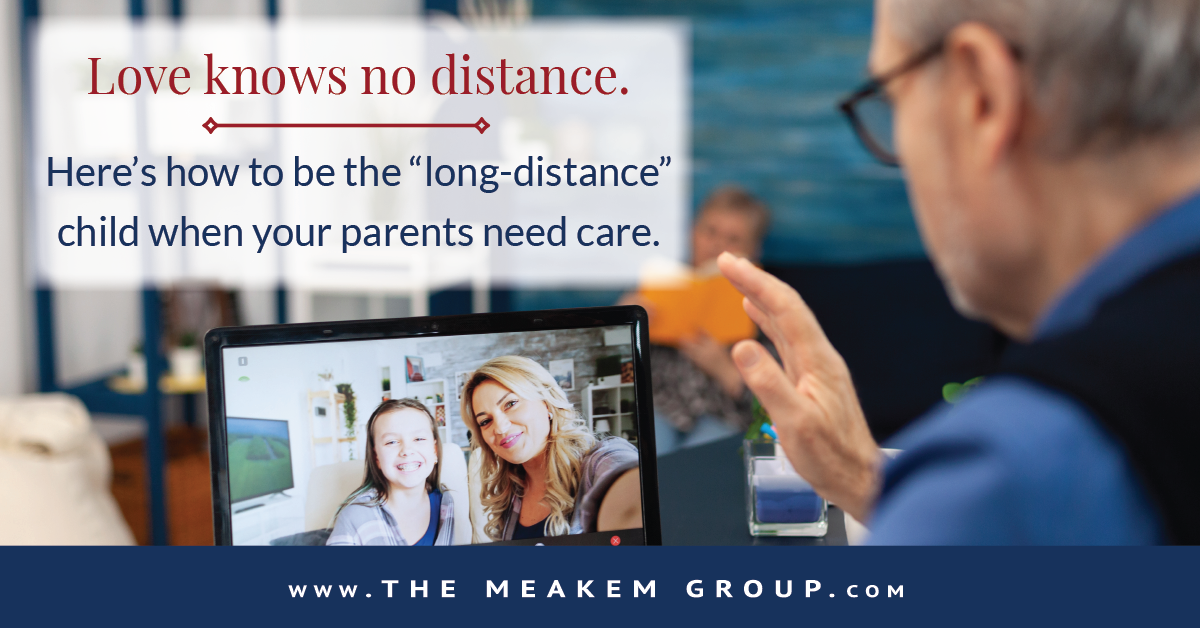
09 Jul Caring for Your Parents, Part 2: How to be the Long-Distance Kid
Being a caregiver for your parents as they enter their later years is often more nuanced than what we traditionally think of as “caregiving.” Living a significant distance away or even out of state might make you feel like you’re unable to contribute to their care in meaningful or valuable ways, and can easily lead to feelings of guilt. We recently talked about how to care for your parents if you’re the kid who lives nearby, so let’s take a look at how you can support your parents as they age, no matter how far away you live.
Keep the Party Line Open
One of the biggest challenges of caring for your parents from a distance is feeling out of the loop. If your sibling is handling day-to-day care needs, it can be easy to miss health updates or lifestyle changes and generally feel like you’re missing out on time with your parents. Be proactive about communicating with your parents, whether that’s through phone calls, texts, emails, Facetime, or even snail mail. If your children are younger, ask them if they want to draw pictures or send cards to your parents (after all, who doesn’t love receiving mail?). As your parents age and memory challenges may come into play, it can be especially helpful to create a schedule for calls or video chats that they can make note of on a calendar or somewhere else easily visible. Bear in mind that technology can be a hindrance as well as a help. Texting can be difficult with arthritic fingers, and the latest innovations might be overwhelming. On the other hand, newer tech like smartwatches are a great way to keep track of your parents’ health data, as long as they choose to share that information. Talk to them about what feels meaningful and manageable, and emphasize your desire to be a part of their lives, regardless of physical distance.
It’s no secret that working together requires frequent, open communication. Schedule uninterrupted time to talk with the family members who live close to your parents, and get it all out on the table. What amount of caregiving are they comfortable with and realistically able to provide? Make a list of everything that will need to be tended to, including financial and legal tasks, healthcare, various appointments, house maintenance, etc., and determine who will be in charge of each task. Are you employing non-family caregivers? Make sure they know who to call for which type of needs. Utilizing an online document or platform for shift notes can also help you stay in the loop with evolving care needs.
What Can You Do from a Distance?
You’d be surprised how much tangible help you can offer your parents thanks to remote and digital service options! Many tasks, like coordinating legal matters and finances, overseeing vacation properties, and virtual meetings with a financial planner, are easy to handle long-distance. If you’re helping with your parents’ financial matters, setting up auto-bill-pay is a low-maintenance way to check off a task (and is a good time to help your parents audit and minimize bills where possible). Amazon lists are a great tool for handling regular or specialty purchases, like medical supplies, pet food, and toiletries, and grocery delivery apps make it a cinch to ensure your parents have their favorite food items on hand, especially if they’re no longer able to drive. You can also organize respite care through friends, family, or a professional service to give your siblings a break when needed.
Senior citizens are often targeted by numerous solicitations through junk mail, making them easy targets for elder fraud. An easy way to help manage your parents’ mail is by signing up for USPS Informed Delivery®. You’ll get email notifications of expected mail or package deliveries, often with a picture of inbound mail items, so you can easily check for junk mail and make sure packages aren’t stolen. There are also tools that may help limit junk mail in the first place like the National Do Not Mail List or a subscription service like DMAchoice.
Caregiving Matters, No Matter the Distance
There’s a lot you can do for your parents from afar, but that doesn’t mean you won’t sometimes struggle with feelings of guilt or feel like you’re not doing “enough.” Compassion fatigue is common among caregivers, and it can easily make you feel that no matter how much you do, it still isn’t enough. Remind yourself that you are just one person, and your best is good enough. What you’re doing is no small feat; it matters immensely, and the ways you express your love and gratitude for your parents simply by showing up from a distance make a world of difference.



